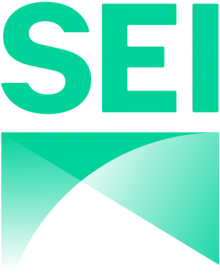Stockholm Environment Institute
 | |
| Abbreviation | SEI |
|---|---|
| Formation | 1989 |
| Type | Foundation |
| Headquarters | Stockholm, Sweden |
Region served | International |
Official language | English |
Executive Director | Måns Nilsson |
Budget | 161 333 120 SEK (Foundation: 2016)[1] |
Staff | 230 (2018)[1] |
| Website | https://www.sei.org/ |
_(3172553904).jpg.webp)
The Stockholm Environment Institute, or SEI, is a non-profit, independent research and policy institute specialising in sustainable development and environmental issues,[1] with seven affiliate offices around the world.[2] SEI works on climate change, energy systems, water resources, air quality, land-use, sanitation, food security, and trade issues with the aim to shift policy and practice towards sustainability.[1]
SEI wants to support decision-making and induce change towards sustainable development around the world by providing knowledge that bridges science and policy in the field of environment and development.[1]
History
SEI was established in 1989 as an initiative of the Government of Sweden. The name of the Stockholm Environment Institute is derived from the 1972 UN Conference on the Human Environment in Stockholm.
Activities
Programs
- Ecological Sanitation Research Programme
- LEAP: Long-range Energy Alternatives Planning System
- Resources and Energy Analysis Programme (REAP)
- Regional Air Pollution In Developing Countries (RAPDIC)
- Sustainable Mekong Research Network Programme (SUMERNET)
- weADAPT (weADAPT.org)
- WEAP: Water Evaluation And Planning System
- TRASE Transparent supply chains for sustainable economies.
- SIANI Swedish International Agriculture Network Initiative (siani.se)
Partnerships
- SEI was one of the organizations who founded the Sustainable Sanitation Alliance in 2007 together with the German Development Organization (GIZ)[3]
Organizational structure
Executive Directors
- 1989–1990 Gordon T. Goodman
- 1991–1995 Michael J. Chadwick
- 1996–1999 Nicholas C. Sonntag
- 2000 Bert Bolin (interim Executive Director)[4]
- 2000 Lars Nilsson (interim Executive Director)
- 2000–2004 Roger Kasperson
- 2004–2012 Johan Rockström
- 2012–2018 Johan L. Kuylenstierna
- 2018–present Måns Nilsson (Executive Director)
Centres
SEI operates in seven countries: Sweden, United States, United Kingdom, Estonia, Thailand, Kenya, and Colombia.
Funding sources
The Swedish International Development Cooperation Agency (Sida) is SEI's main donor. SEI also receives funding from development agencies, governments, NGOs, universities, businesses, and financial institutions.[5]
For example, the Bill and Melinda Gates Foundation also provides funds to SEI in the area of maternal health[5] and in sustainable sanitation.[6][7] At the SEI Science Forum in 2015, Melinda Gates took part to discuss sustainability and gender together with SEI staff to help shape SEI's future research.[5][8]
See also
- Stockholm Resilience Centre
References
- 1 2 3 4 5 "About the SEI". SEI. Stockholm Environment Institute. Retrieved 7 September 2021.
- ↑ "Stockholm Environment Institute | UIA Yearbook Profile | Union of International Associations". uia.org. Union of International Associations. Retrieved 7 September 2021.
- ↑ "1st SuSanA meeting, Eschborn, January 2007, Germany". Sustainable Sanitation Alliance. Retrieved 9 December 2016.
- ↑ http://miljoaktuellt.idg.se/2.1845/1.277951/johan-rockstrom-ar-arets-svensk
- 1 2 3 "Annual Report". Stockholm Environment Institute. Retrieved 9 December 2016.
- ↑ Elisabeth von Muench, Dorothee Spuhler, Trevor Surridge, Nelson Ekane, Kim Andersson, Emine Goekce Fidan, Arno Rosemarin (2013) Sustainable Sanitation Alliance members take a closer look at the Bill & Melinda Gates Foundation’s sanitation grants, Sustainable Sanitation Practice Journal, Issue 17, p. 4-10
- ↑ "Sustainable Sanitation Alliance: Grant of $2.7 million to supercharge sustainable sanitation knowledge platform". Sanitation Updates. 4 November 2016. Retrieved 9 December 2016.
- ↑ "Youtube video: Melinda Gates 'Gender aspects of global development'". Stockholm Environment Institute. 10 June 2015. Archived from the original on 2021-12-13. Retrieved 9 December 2016.